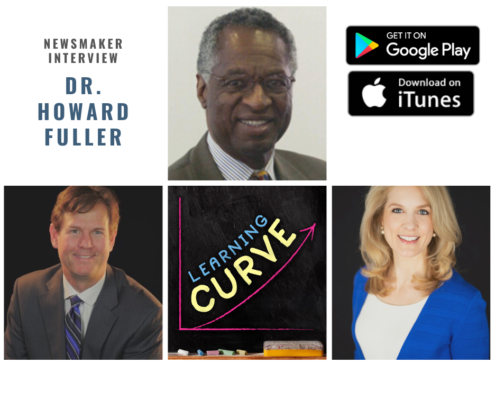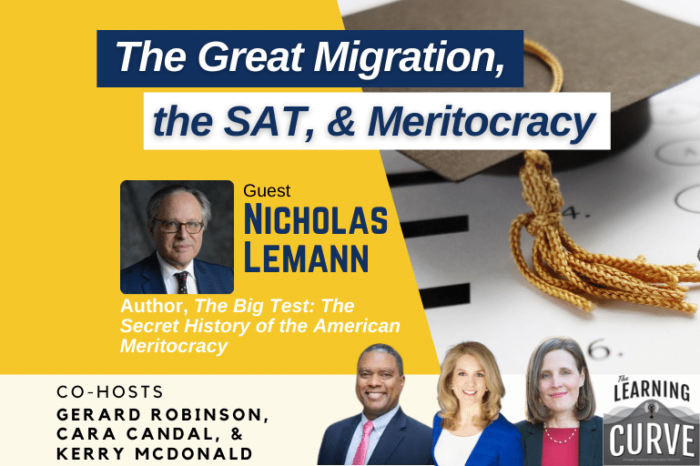Columbia’s Prof. Nicholas Lemann on the Great Migration, the SAT, & Meritocracy
/in Academic Standards, Featured, Podcast, Related Education Blogs, US History /by Editorial StaffThis week on “The Learning Curve,” guest co-host Kerry McDonald talks with Nicholas Lemann, Joseph Pulitzer II and Edith Pulitzer Moore Professor of Journalism and Dean Emeritus of the Columbia School of Journalism, and author of the books, The Promised Land: The Great Black Migration and How It Changed America, and The Big Test: The Secret History of the American Meritocracy. He reviews the history, design, and purpose of the SAT and standardized assessments of academic merit, and how secondary schools and higher education institutions have used, or misused, tests as they relate to race and equality of educational opportunity. He offers thoughts on colleges’ and the American Bar Association’s recent shift away from standardized testing, and the impact on American education and society. Another topic they cover is the Great Migration, the movement of six million Black people from the American South to Northern, Midwestern, and Western states between 1910-1970. They explore the larger lessons about this pivotal episode in American history, and the social and educational policies that might help remediate our society’s ongoing racial struggles.
Stories of the Week: Co-hosts Cara Candal and Gerard Robinson discuss a school choice program in Michigan, that would have provided nearly $8,000 to help families with private school tuition or other expenses such as tutoring, but was vetoed by Gov. Gretchen Whitmer. Also, most education technology companies have seen a steep decline in valuation since the pandemic, defying many expectations that school closures would accelerate and expand the marketplace for digital learning.
The next episode will air on Weds., May 25th, with Patricia Puertas Rucker, a West Virginia state senator serving the 16th District, and chair of the Education Committee.
Guest
 Nicholas Lemann served as Dean of Columbia Journalism School from 2003-13. Now Dean Emeritus and Joseph Pulitzer II and Edith Pulitzer Moore Professor of Journalism, he also directs Columbia Global Reports, a book publishing venture, and Columbia World Projects, a new institution that implements academic research outside the university. Lemann is a staff writer at The New Yorker. Widely published, he is the author of six books, including Transaction Man: The Rise of the Deal and the Decline of the American Dream (2019); Redemption: The Last Battle of the Civil War (2006); The Big Test: The Secret History of the American Meritocracy (1999); and The Promised Land: The Great Black Migration and How It Changed America (1991). He is a member of the New York Institute for the Humanities, the American Academy of Arts and Sciences, and The American Academy of Political & Social Science.
Nicholas Lemann served as Dean of Columbia Journalism School from 2003-13. Now Dean Emeritus and Joseph Pulitzer II and Edith Pulitzer Moore Professor of Journalism, he also directs Columbia Global Reports, a book publishing venture, and Columbia World Projects, a new institution that implements academic research outside the university. Lemann is a staff writer at The New Yorker. Widely published, he is the author of six books, including Transaction Man: The Rise of the Deal and the Decline of the American Dream (2019); Redemption: The Last Battle of the Civil War (2006); The Big Test: The Secret History of the American Meritocracy (1999); and The Promised Land: The Great Black Migration and How It Changed America (1991). He is a member of the New York Institute for the Humanities, the American Academy of Arts and Sciences, and The American Academy of Political & Social Science.
Tweet of the Week:
Americans are nearly 10 times more likely to strongly support ESAs than strongly oppose them.
Source: https://t.co/SZq2UrYl39 pic.twitter.com/tfR9WhXFCh
— EdChoice (@edchoice) May 18, 2022
News Links:
A School Choice in Michigan
It’s Been A ‘Brutal’ Year for Public Education Companies
Get new episodes of The Learning Curve in your inbox!
Read a Transcript of This Episode
Please excuse typos.
[00:00:00] GR: Hello listeners. Welcome to another wonderful, exciting enlightening session of a learning curve. Every week we bring on a great guest sometime guests, but of course we can never do this, but I’m having two people on the call who can make life great. And of course, with Caribbean on the call, life is already.
[00:00:22] Cara: I am well, life is great. Gerard feeling, , a little bit tired this morning, but I’m actually with family in an undisclosed location. Of course though. So really nice to be with families. So I’m feeling fortunate. It is wonderful to hear your voice, just a ton going on in the world. I know.
[00:00:41] As usual a ton going on in, Boston, probably relevant in that. Boston is one of the major urban centers that folks like to watch, especially when it comes to NAEP scores and stuff like that. We’re going through a huge superintendent search. , there’s continued talk of receivership, stuff like that.
[00:00:58] So. Not that that’s great, [00:01:00] but, it’s sort of exciting. It’s education never stops, right? Education, policy and reform the need for it. It never sleeps. And that’s why you and I don’t sleep Gerard because we’re always here trying to tell people what’s up and what’s going on. What’s going on here.
[00:01:16] GR: So it’s funny, you’d bring up school choice because my story or the week in fact is about school choice and it’s from your home state of Michigan. And so governor Whitmer, she decided to the, a bill that was passed last autumn, the student opportunity scholarship program. And under that program had the governor not vetoed it, it would provide up to $7,800 for private school tuition.
[00:01:44] Or expenses such as tutoring, the program like many of the programs across the country that are focused on scholarships, really target, , lower income families, as well as middle income families. And as we know from guests that we’d have from our own professional and personal [00:02:00] experience, there are families who love private education.
[00:02:03] Not because they hate public schools. It’s because they love private education and what it has to offer. And given the. That they are taxpayers. They want to use some of their money for that. So it was Beto. And of course, some of the critics say, there’s no research to show that in fact, if passed and comes law and it gets into action, that it would make a difference.
[00:02:24] There are a couple of researchers, a new report published by the Mackinaw center, which is a Michigan think tank part of the SPN network. they looked at a number of scenarios and two of the researchers, one has been to grow the other ones, Martin, Lukin, who I met years ago when he had first began his career at, university of Arkansas has moved on then to do other work.
[00:02:46] So they’ve been identified. They have the program in fact, went into. It would either a cost taxpayers as little as 106 million, or save them as much as [00:03:00] 386 million. So let me stop there. One of my criticisms within the family of the school choice movement is that we have to be very careful when we say that a choice program has no financial impact on the public school, particularly when the student leaves, I mean, it has an impact one way or another.
[00:03:19] So we would short in a movement of enough to say, as these two scholars have done either have a loss or a gain. And so here’s how we come to both the loss and the gain. So the possible safety. that can happen for the state is because the state will ensure that school districts are funded with at least $8,700 per student.
[00:03:41] And that’s the maximum amount the state would have paid for an opportunity scholarship, roughly 90% of that. And so for the. To say that they are left with no money is simply on true. We’ll just go to the next area. So the districts could actually save money because could spend [00:04:00] less money on variable costs, when students leave private schools.
[00:04:03] So the Arthur’s calculate that in the short term, there’s some variable costs that can come from classroom instruction and services such as constantly and professional. The estimate that that could cause, or save as much as $8,755 per student, which is more than they would lose with 8,700. But then they say, let’s take it a step further.
[00:04:24] They said gains and losses will. It depends on what is called the switcher rate. Now this isn’t a title or phrase that existed 30 years ago when the Milwaukee program began. And so one of the scholars, Martin published a paper in March, 2020. And in his paper, he looked at the fiscal impact of K-12 education choice.
[00:04:47] And he talked about the switcher program. And according to his program, if this is when, so these are students who left public schools and went to private schools, that’s the switcher rating. So [00:05:00] here’s how the authors calculate the. It is the percentage of students who use the scholarship for private schools who otherwise would have enrolled in public schools.
[00:05:09] So it draws a public school. A and I decide to switch to private school C then I’m a switcher. Now the authors say with a 60% switch rate and average scholarship amount of about $6,000, taxpayers would lose $1,400 per scholarship. And people say, RC, we’re losing. But with a 90% switcher rate and scholarships of $4,000, taxpayers would actually save $3,435.
[00:05:43] Put another way, if there’s a 90% switcher rate and the scholarship was 4,000. Taxpayers we’ve saved $3,435. Well, critics will say, I mean, some of our friends would say, there’s no guarantee you’re going to have a 90% switcher weight. Well, [00:06:00] that’s actually not true. So Luke Martin, in a 2020 study, he identified that when he looked at 27, estimates of switcher programs from eight lottery based evaluations of six private school choice programs.
[00:06:15] Across the United States. He identified that the switcher rates for both full samples and subgroups of students range from 52% to 98%. So within the range of what you speaking, that he identified that the lower bound weighted average and medium switcher rate from those studies was actually 84%. So the upper bound weighted average and median Swisher rates are actually not.
[00:06:44] , percent and 89%. When you look at African-American students in three privately funded programs, guess what their switch rate is 93%. And so based upon his evaluation, he believes it’s not unlikely that you could have a [00:07:00] 90% switch rate, which in fact means you can have $3,435 saved per student, which when you go further into the article, identifies that the state could in fact save.
[00:07:13] $300 million. Now of course the governor vetoed it. Well, now it’s now to go to the, voters. And as of right now, there are at least a 500,000 signatures on a petition. And if the petition actually passes, it could go back to the legislature for approval, without need for the governor’s signature.
[00:07:36] So if they get the votes and it goes to the legislature, there’s a good chance that it will become law, but let’s keep one thing in mind in terms of history in 2000. voters had an opportunity to vote for proposal one, which would have created a boxer program in the state. It was soundly defeated 70% to 30%.
[00:07:59] The difference this [00:08:00] time, 22 years later, is that under the current scenario, it can go back to the legislature and it can pass that way. So it is a very interesting, twist of political. We’ll see if they had enough signatures. This is your home state. What are your thoughts?
[00:08:19] Cara: Oh, Michigan. Yes, Michigan pure Michigan.
[00:08:22] have so many thoughts, Jared. First of all, I want to thank you for getting super wonky and weedy in going through this Luke and paper. , I think Ben to grow and Marty Lukin are both wonderful. I’d like to give a shout out to my late colleague, Zach Eckert, who worked really hard on that ESA, by the way.
[00:08:39] , it was a good bill. what I think is so interesting about this, and I’m appreciative of the Marty Lukins of the world who really get into the numbers and can get really wonky because it’s important, right? For folks like you and me. When we, for example, go to testify in front of a state legislature and tell legislators, how much is this going to cost and how much is this going to save?
[00:08:57] But I hate, you know, I always think of when I think about these things, [00:09:00] My mom like love you, mom. You’re amazing. She lives in Michigan, but she doesn’t at the bottom line for her is not about. Cost and who’s going to win out right. There is this draining argument that, oh gosh, everything you do. If you provide a better option for a child in Detroit who has none good gracious, you’re going to harm the public schools for the wealthy kids in west Bloomfield, Michigan, or something like that.
[00:09:22] But you know what my mom cares about is this high-level sort of what’s going on and you and I, when we get really wonky, I think one of the things that studies like this do as valuable as they are. To some extent. And so I’m pushing back here and again, love to Marty and Ben, is it to some extent we’re giving into the narrative, that critics of school choice, right.
[00:09:43] For us, right? So like, oh, we have to address this idea. And what always comes to my mind is that anywhere you have a school choice program, we should also be pointing out to folks that, you know what kids leave. All the time for reasons that we don’t even know about, for reasons that are complete because their [00:10:00] parents are making choices to move to a better district.
[00:10:02] They’re making a choice to move to a better state. We don’t count those numbers. And so we get really worked up about what will happen if 3000 kids go in across the state, by the way, in a state like Michigan, where NAPE scores have been on the decline for years, let’s remind our listeners because we’ve had, a really wonderful scholar.
[00:10:23] I think somebody by the name of Kimberly Robinson on the show, talking about a lawsuit that’s still pending in Detroit because they’re trying to frame, learning and especially literacy as a human, right? Most kids in the city of Detroit who attend their public schools. Can’t. That’s not new by the way, but God forbid, we give them any choices.
[00:10:39] Right? Instead, we get embroiled in this argument of, we have to somehow prove that kids deserve an option and oh goodness. They might take some money with them. Maybe we should be talking about the fact that that money belongs to families. It’s taxpayer money, by the way. And in districts across this country in luminous decline.
[00:10:58] Enrollments declining for [00:11:00] tons of reasons. and again, we don’t capture it. We don’t capture when kids move it. Well, I want to know what the switch rate is when families who can actually afford to go to a better school district up and leave Detroit. Because by the way, parents know parents know that they’re not getting the education that they’re getting.
[00:11:16] Deserve and need. So it’s really interesting stuff. I love the wonkiness of it. I think it helps folks like you and me do our jobs. Hopefully our listeners, I think many of them will find it really interesting. We got to have this data, but I hope that on the whole, we don’t lose sight of the overall argument for people like my mom, like the kitchen table talk. And at the end of the day, to me, Gerard, the kitchen table talk is by the way, when you are perpetually failing children, when you were perpetually failing families, constitutionally, they in under most state constitutions that, , do guarantee some sort of access or.
[00:11:52] Maybe not right. I don’t know Michigan constitution, , Bendigo probably does. but it’s, if we frame education as a human, right. Which indeed I think it [00:12:00] is. I think you think it is too. I’m pretty sure your wife thinks it is we should be talking about it in those terms.
[00:12:04] Nonetheless. A really interesting paper. I think folks like Merde for, for doing the financial data because we need it. And certainly I’m not your girl. I’m not the person who’s ever going to be able to do that, but thank you for that Gerard. And always like to hear about my home state, the beautiful state of Michigan.
[00:12:23] even when sometimes I find it really frustrating. We’ll see what happens with that ESA. I think you’re right to point out the history here and probably. Not in favor of families, but we shall see, we can always hold out hope. Gerard, I’ve got an interesting article today and we’ve talked a little bit on this show about for-profit education, mostly in terms of charters in this attack on charters as, oh my gosh.
[00:12:48] They contract with for-profit companies and we love to ignore the fact or some love to ignore the fact I’m looking at you by an administration that actually, Public school districts have to contract with for-profit companies all the [00:13:00] time to get things done. So at any rate, many of us, Gerard invested in online tools.
[00:13:07] What we might call ed tech during the pandemic. I know I certainly did stuff that I thought I would never let my even five-year-old do online at the time. Five-year-old six-year-old do online. suddenly it was, let’s get a Chromebook and here’s a math program. So we would think that ed tech companies.
[00:13:24] Booming right now, post pandemic during the pandemic. And because many of them started up, let’s not forget by the way, to your previous story, that in 2020 on the heels of the pandemic, we doubled the number of ESA programs in this country, education savings accounts. What does that mean? That means you need technology.
[00:13:43] In order to bride platforms, something that almost looks like I like to tell people, it looks like Amazon so that when people have state money in their account, they can go in and choose from a list of state approved services. You need technology to make that happen smoothly for parents. So we would think that ed tech should be booming.
[00:13:59] I know a [00:14:00] lot of our listeners probably went to ASU GSV recently and learned all about this. But according to my article in Forbes, by a guy named Derek Newton, it’s been a brutal. For public education companies. So education companies that have gone public and this, I found really, really surprising. So for example, they talk about out of nine tech companies in a group surveyed by a gentleman named Phil hill.
[00:14:27] Almost all of them went down in value. For example, some went from 41% to around 20%. They lost value in the stock market. I mean, that is really astounding. When you think about it. Interestingly, the only one in this group that went up is Pearson education. Now. Teachers and others might know Pearson.
[00:14:49] It’s a textbook company. They do a lot in the testing space. , formative assessments, , I mean, goodness gracious, who knows where we’re going in terms of testing companies and, , annual summative assessments. As we [00:15:00] watched dates very unfortunately pulled away. But I think that formative assessments are a place, but Pearson.
[00:15:05] Is a really old company. It’s 178 years old. Cause it’s a publishing company compared to some of these ed tech startups. And so it sounds like we’re in a place where the bubble is sort of bursting a little bit. And I just want to quote here from this article, according to the author, he says, when you see the value retreats, these companies together, a view of the market as a unit, the results are somewhat shocking.
[00:15:32] The pandemic was after all. It’s supposed to accelerate education tech and digital learning specifically. And it was supposed to be the moment when these companies not only proved their value, but richly rewarded their investors. Now I know that the idea of investors being rewarded from education ventures make some listeners squeamish, but this is the world.
[00:15:53] And, as I said, Public school districts also have to draw on for-profit publicly traded companies. it’s a [00:16:00] fascinating article because I think maybe what we’re seeing is just the decline on the end of, as people return back to school, as people don’t want their kids on screens all day.
[00:16:12] Parents are going to start picking and choosing what are the things that work? What are the things that really add value to my kids’ education to my life? And what are the things that don’t, and it could be that, post pandemic, there were a lot of great ideas out there, but now we’re really going to separate the good from the bad and the wheat from the chaff and see what works for parents.
[00:16:31] So this is one to watch, rarely get to talk about, the stock market when it comes to education on the learning curve. But I found this story to be absolutely facet. Okay, Gerard enough of our chit-chat. I think that it is probably time to bring in our guest. And this week we’re speaking with Nicholas Lehman, he is the Joseph Pulitzer, the second and Edith Pulitzer Moore professor of journalism and Dean emeritus of the Columbia school of journalism, author of the books, the promised land, the great black [00:17:00] migration and how it changed America and the big tests of good book, the big test, the secret history of the American meritocracy.
[00:17:07] So much to talk about. Coming up right after this friend of the show, Kerry McDonald is going to be interviewing our guest, Nicholas Lemann.
[00:17:47] Kerry: Well, I am thrilled to be able to welcome Professor Nicholas Lemann to the Learning Curve podcast. Nicholas Lemann served as Dean of Columbia journalism school from 2003 to [00:18:00] 2013. Now Dean emeritus and Joseph Pulitzer, the second and Edith Pallister Moore professor of journalism. He also directs Columbia global.
[00:18:09] A book publishing venture and Columbia world projects, a new institution that implements academic research outside the university. Lemon is a staff writer at the new Yorker he’s widely published and is the author of six books, including transaction man, the rise of the deal and the decline of the American dream redemption.
[00:18:30] The last battle of the civil war. The big test, the secret history of the American meritocracy, the promised land, the great black migration and how it changed America. He is a member of the New York Institute for the humanities, the American academy of arts and sciences and the American academy of political and social science professor Lemmon.
[00:18:52] Thank you so much again for being on the learning curve podcast.
[00:18:55] Nicholas: Thank you for having.
[00:18:58] Kerry: I’m excited to talk about a [00:19:00] couple of your books today. as I mentioned in your bio, you’ve written several excellent books. We’re going to talk today, though, about the big test, the history of the American meritocracy.
[00:19:10] Which remains for the definitive volume on the sat. Would you tell our listeners why you decided to write this book as well as talk about the larger role of standardized tests and trying to measure and evaluate academic merit and individual success in American education.
[00:19:27] Nicholas: Well, a lot of non-fiction writing is quasi autobiographical.
[00:19:33] Even if the writer doesn’t use the first person. So I sort of grew up shaped by the system that I’m describing here. So that was part of it. and I wonder, , who invented this? Where did it come from? I was. Doing a previous book that you mentioned called the promised land. And in doing that book, I was, spending a lot of time in.
[00:19:55] Poor neighborhoods in, mostly in Chicago, in Mississippi.[00:20:00] , it doesn’t exist anymore because it’s been torn down. But at the time I was doing the book, the largest public housing project in the world was that Robert Taylor homes on the south side of Chicago. And I was there a great deal because one of the main characters in that book lived there and I’d go visit her talk.
[00:20:20] so the thing with the Robert Taylor homes was, it was, just a couple miles from downtown Chicago and new to Chicago in the loop. And it was right on a elevated train lawn. So you could look out of the window of the apartment and see it, it was really nearby and yet it seems. A million miles away.
[00:20:43] I started thinking, why does opportunity seem so, Universal to so many people in America and so distant to other people, what’s the structure system that distributes chances to [00:21:00] advance yourself in our society. that was another motivation for me. And getting started on that private.
[00:21:06] Kerry: So the big test traces, the history, origin design purpose of the sat who invented it. And why could you talk about Henry Chauncey, James Bryant, Conant, and their ideas about testing and education and whether the system they pioneer. Apportioned opportunity equally or fairly. You’ve just mentioned, why that might not be the case, but in particular, could you discuss how high schools, colleges and universities have used, or as the case may be misused tests as they relate to race and equality of educational opportunity?
[00:21:39] Nicholas: Okay, well, so first of all, like a lot of things in life, the people who started this system. All the things you just sort of alluded to just didn’t occur to them for even a second. They were trying to do one thing, one set of things. And didn’t think about another set of things that turned out to be controversial [00:22:00] about the system.
[00:22:01] So the person who actually invented the sat was a man named Carl Brigham, who was a psychologist, and who had been involved in early IQ testing. The first administration of the sat was 1926, almost a hundred years ago. , James Conan was the president of Harvard taking over in 1933. And Henry Chauncey was, an assistant Dean at Harvard who worked for Kona.
[00:22:31] So at the time, Undergraduate college was dominated by, I guess what you’d now called preppies, that is people who came from fortunate circumstances and had been to new England boarding schools and that sort of thing. And Conant, wanted to. Change the university can change the population of the college somewhat.
[00:22:56] So he decided to start a [00:23:00] scholarship program and he called in Henry Chauncey and he said, I need you to find me, 10 or 12 people a year who will come to Harvard on full scholarship. That’s what we called Harvard national scholars. And I’m looking for. Don’t live on the east coast and didn’t go to private school, but who have extraordinary academic ability.
[00:23:21] So your job in return is to find some way of locating these people find a test or something. So Chauncey went around and visited all the people who were doing tests at that time, met Carl Brigham and came back and said, we’ll use the sat to identify these scholarship students. So that’s kind of how it all.
[00:23:43] Kerry: Really interesting. And so over the last couple of decades, higher education and even elite colleges have gradually backed off from requiring sat scores for applicants. I know I went to Boden college, which several decades ago, was one of the first. Colleges to [00:24:00] make sat submissions optional for applicants.
[00:24:02] And this is especially true during COVID with more universities and colleges making the sat optional in terms of application procedures. And the American bar association has called for law schools to set aside L sat scores. So as testing of all kinds is increasingly coming under fire across K-12 and higher education, uh, like.
[00:24:24] Will this lead to greater academic excellence. Do you think, and racial equity in American education and society at large,
[00:24:30] Nicholas: academic excellence in racial equity, aren’t exactly the same thing. and that raises an issue, which is, the sat was originally. Administered to find 10 students for one college.
[00:24:45] but for reasons I can tell you if you’re interested, it became an instrument that millions of American high school students would take every year as this sort of. Because there was the interface between high school and college. [00:25:00] So it was perceived and to some extent was a kind of gateway to opportunity in America for millions of people, not a way of.
[00:25:11] picking a small hint for, with future academics. , and that meant that, , everything got a lot more charged than it had been when it was starting. , and one of the many issues that came up was the people who there was a moment that we now forget more than moment period. When, what, I guess you would call the white liberal establishment in the U S.
[00:25:34] I was just, didn’t think very much about race. even during the Jim Crow era, and that includes, Franklin D Roosevelt. It’s amazing. If you go back and read things written by American liberals from about, 1880 to about 1960, if they’re white, they almost never mentioned race as an issue in the United States.
[00:25:58] So didn’t [00:26:00] occur to. Inventors of this system that it would, conflict with. Racial equity. And indeed, if you ask them, what do you think of racial equity? They would accuse you a blank look because it just wasn’t part of the mental equipment that this was an issue that they should think about. so it turned out that there was a real conflict between the goal of admission by sat or act and.
[00:26:31] The goal of, I wouldn’t call it instead of racial equity, I would call it racially integrating elite universities to a much greater extent. Those two goals did not go naturally hand in hand. They were voluntarily adopted by most of the elite universities at roughly the same period of time, but they don’t, naturally go together and that’s led to a lot of controversy.
[00:26:58] Kerry: So we’ve been talking [00:27:00] a lot about your book, the big test. I think we could probably spend our whole time today talking about that, but I do want to get to the second book that we’ll be discussing, which is your book called the promised land, the great black migration and how it changed America, which was a New York times bestseller in 1991.
[00:27:19] Would you tell our listeners about the great migration, one of the largest movements of people in us history we’re approaching. 6 million black people moved from the American south to Northern Midwestern and Western states, roughly from the 1910s until the 1970s. Can you shed some light on that?
[00:27:36] Nicholas: Yeah, the great migration when I started working on this book, which was, , around 1980, I guess, it’s weird that the great migration, which as you say is one of the most significant internal migrations, not just in American history, but in world history.
[00:27:53] it wasn’t part of the conversation. It’s much more part of the conversation now. And my thinking was.[00:28:00] this deserves a book. can’t police there. Isn’t real full dress book about it, especially since at that point. many, many, many migrants were still alive, so you could go talk to people who’d been through it.
[00:28:13] so basically, for reasons going back to slavery, , black American. Was predominantly Southern from the very beginning and has more opportunities opened up outside the south during the Jim Crow era, especially, and as there were fewer opportunities in the south, especially if you. Didn’t want to be a field hand picking cotton people realized that they could dramatically change their life circumstances just by, for example, getting on a bus and taking the trip from Mississippi to Chicago.
[00:28:54] And so millions and millions of people did, they went, , up the train lines and bus lines from the central [00:29:00] south up to Midwestern cities like Chicago from the Atlantic coast up to cities like New York and Philadelphia and Boston from places like Texas, often west to Los Angeles and San Francisco.
[00:29:13] Kerry: Right. So the promised land really captures this cross-country migration by car and by train of the rural Southern African American sharecroppers and workers to these Northern cities, as well as really gets into how this migration changed. These cities with Southern food, faith, work, manufacturing, and culture.
[00:29:33] Authors like Zora Neale, Hurston, and Richard Wright and musicians, including Louis Armstrong and muddy waters lived and told this story. Could you talk about the larger lessons in terms of our shared history, civil rights and public policies that educators and lawmakers should know about this pivotal episode in America?
[00:29:52] Nicholas: , , I would go back to some of what we were talking about before, about why didn’t white, liberal. Think [00:30:00] about race as a big issue, for a long time. And part of the reason was, the language of the time was that the Negro problem , people would say race is, a distinctive.
[00:30:13] American dilemma to use the title of a famous book, but it was seen as a Southern issue because most black people lived in the south and what the great migration did was nationalized race. It made race and national issue rather than a regional issue. And. Pervades our society in many, many, many different ways, in terms of culture, music, literature, all those things, food, , that you just mentioned in terms of politics and political struggles, cultural issues, all that stuff.
[00:30:49] if you think about how the murder of George Floyd sort of ignited the country, Things like that always happened outside the south, but [00:31:00] most white people thought things like that happened, but they only happened in the south. and so , there wasn’t the same sort of consciousness of race relations as a non regionally.
[00:31:14] Kerry: So to sort of wrap up, because I think this is an important point to end on is your book was written in the early 1990s and explored these wider questions about race and racial equality. which of course well preceded the murder of George Floyd in 2020 by a white police officer, in a midwife.
[00:31:33] The city. So from MLK’s mistreatment during the Chicago freedom movement in 1966 to bossing in the 1970s in Boston, black people have also obviously experienced these historic injustices in Northern cities. Would you talk about the social and educational policies that might help remediate America’s ongoing racial stress.
[00:31:54] Nicholas: that’s a huge topic and it, has been under debate [00:32:00] for a really long time. And I, in the book, go into a lot of detail on the early phases of the debate, long story short. there was an attitude among some that the problem is the Jim Crow system of legal segregation in the south. And if we get rid of the Jim Crow system, everything will be fine.
[00:32:24] Well, that turned out not to be true, even though getting rid of the Jim Crow system was an enormous achievement. So, , the voting rights act of 1965, Past and became law, huge, huge landmark. And then just a few days later, Watson, Los Angeles, whenever and flames over a policing incident, in a place that didn’t have Jim Crow laws.
[00:32:50] , so that’s a kind of capsule way of saying it. there’s no one little thing that would help. there’s a lot of big things that would. I think the [00:33:00] model would be to get beyond having segregated country. , and if we can do that and housing and education and employment and all those big systems, I think that’s the best thing to do.
[00:33:15] a little frustrating in the George Floyd moment that so many people, at least white people, frame this as, an attitudinal issue, that there’s something called a racist. And if you are one that’s bad, but you can sort of be trained and then you’re not one. And then everything’s fine.
[00:33:35] , it’s going to take a lot more than.
[00:33:37] Kerry: Such important and timely work, even now, even though you wrote these books, again, back in the early 1990s in the 1990s, the promised land and the big test, still very relevant today in 2022, professor Nicholas lemon. Thank you again for being on the learning curve podcast.
[00:33:56] Nicholas: You’re welcome. Glad to be here. [00:34:00]
[00:34:08] Cara: As always listeners, we’re going to close it out with our tweet of the week. This one’s super appropriate, especially to Gerard story about my beautiful home state of Michigan. It is from ed choice. Also home of Marty Lukin who wrote the paper. We. The quote is this Americans are nearly 10 times more likely to support ESS than oppose them.
[00:34:28] And that is coming from ed Choice’s annual public opinion survey. I love this because what it really is, what it really shows us is that most Americans probably don’t know what an ESA is. But when you tell folks, if you could tell. The money that the state allocates to your child’s education and choose the school or educational experiences and services that are best for them.
[00:34:51] Would you support that and resoundingly, most Americans say, yes, it’s all in how you ask the question folks and giving people the [00:35:00] experience, more people that have that experience the better. We’re going to learn a lot about that from our guest next week and learning curve listeners. When you tune in next week, we are going to have with us just wonderful human wonderful woman, Senator Patricia Portis, Rutgers.
[00:35:14] State of West Virginia, the state, which has launched, , accepting applications for the most expansive ESA in existence. All students in West Virginia who have previously attended a public school are eligible for this education savings account or scholarship account, as some might call it. And we are going to be speaking with Patricia Rucker, who was absolutely critical.
[00:35:38] She sponsored the bill critical, getting it passed. And as the current chair of the Senate education committee, Until then learning curve listeners, please take good care. And we’ll be back with you real soon.

Derrell Bradford on the Future of Education Reform
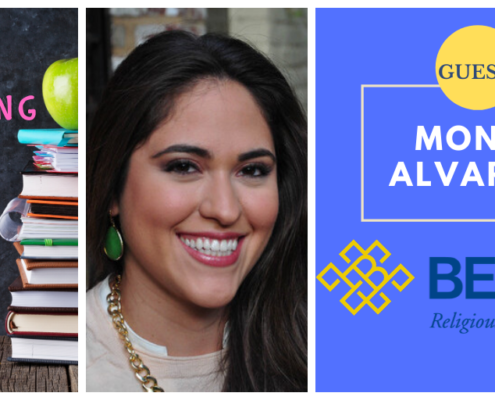
Montse Alvarado on Protecting Religious Liberty in Schools & Society
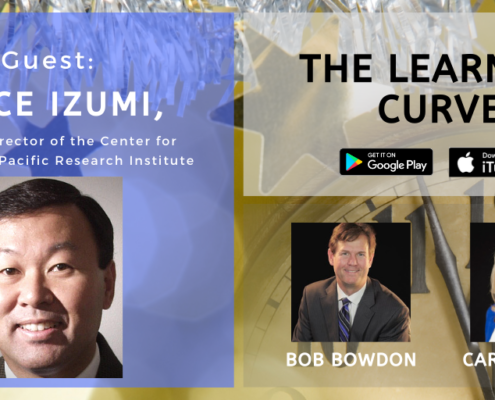
Lance Izumi on How Charters Are Meeting Diverse Learning Needs
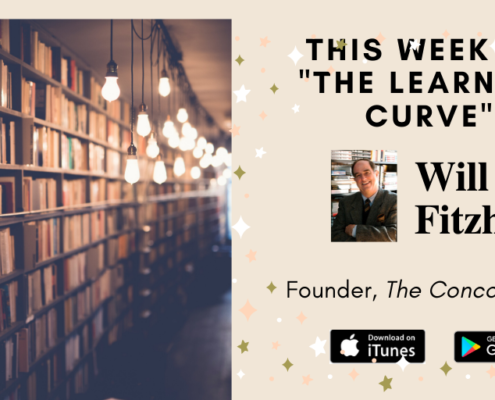
Will Fitzhugh on the Enduring Relevance of History Research & Writing
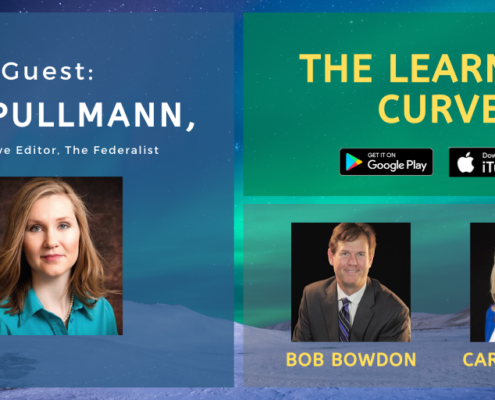
Joy Pullmann on the Fallout from Common Core
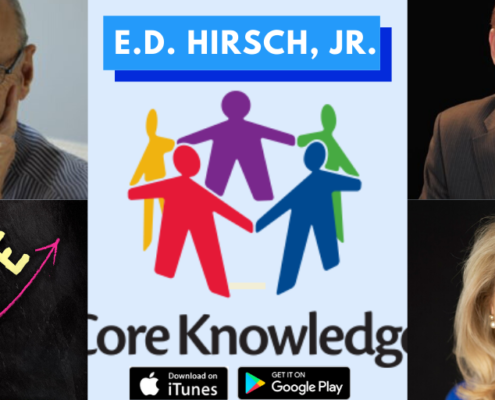
This Week on The Learning Curve: E.D. Hirsch, Jr. on Background Knowledge & Educational Equity
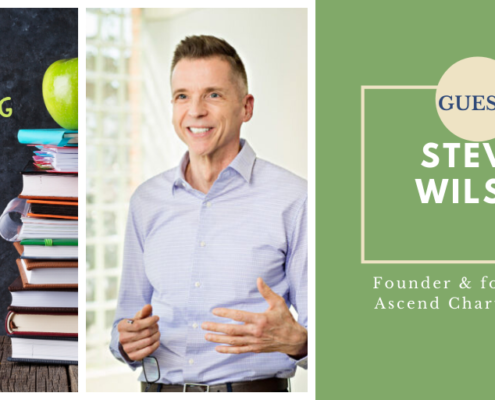
Steven Wilson on Anti-Intellectualism in K-12 Education
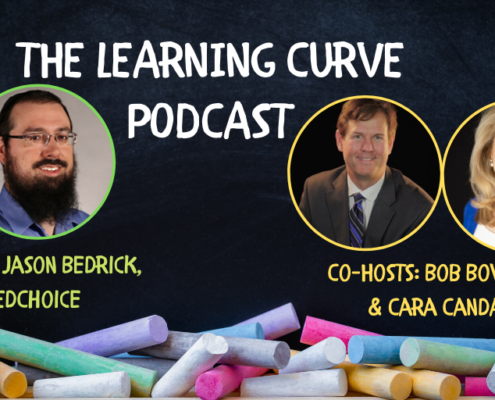
Jason Bedrick on Religious Freedom & Private School Autonomy
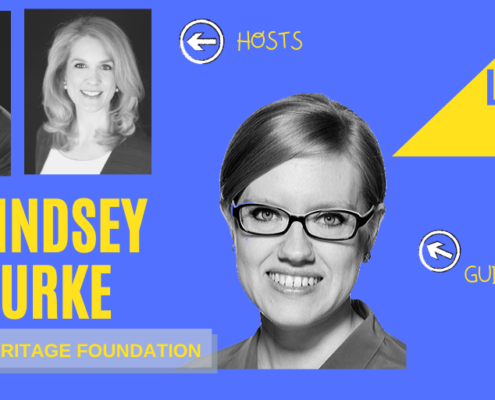
Dr. Lindsey Burke on LBJ’s True Education Legacy
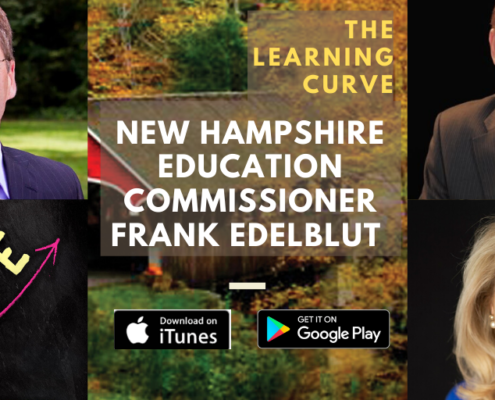
NH Education Commissioner Frank Edelblut on State-Driven K-12 Reform
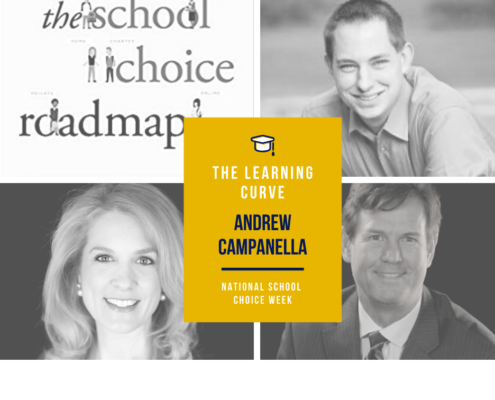
The Learning Curve: Andrew Campanella, President of National School Choice Week
